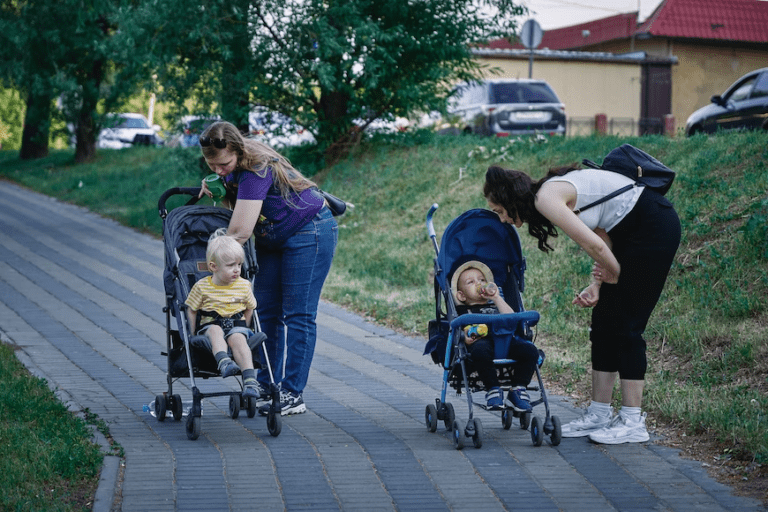Second Baby: What Has Changed?
Congratulations on the upcoming arrival of your second baby! While you’re no stranger to parenthood, the addition of another little one brings its own unique set of changes and joys. Whether you’re two weeks pregnant or in the home stretch, you’re probably wondering about the new dynamics a second child will bring. As you already know, parenthood is a journey that’s as rewarding as it is challenging. Here’s what you can expect as you expand your family.

Source: Yuganov Konstantin/Shutterstock.com
Budget Adjustments Ahead
The financial aspect of raising a child is significant, and with two kids, your budget will naturally evolve. While some items, like toys and books, can be reused and shared, you’ll need to spend money in other areas:
- Double the Essentials: Depending on the age of your first child, you may have double the expenses on everyday items like diapers, wipes, and formula (if using).
- Childcare Costs: If both children require childcare, there will be a considerable expense increase.
- Healthcare: Factor in additional health insurance costs and medical expenses for the new little one.
- Clothing and Gear: Growing children have different needs, so budget for clothing, car seats, or upgraded gear.
- Plan for the Future: Consider long-term expenses like education savings plans for both children.
As you await the arrival of your newest bundle of joy, take time to revisit your budget and make adjustments as needed to accommodate your growing family.
Revised Schedules
With one child, you might have found a rhythm that worked for you. With two, be prepared for a bit more multi-tasking. Consider the following:
- Schedule Management: You’ll need to juggle between the baby’s feeding and sleeping schedule and your older child’s activities and routines.
- Family Activities: Family activities will have to cater to both a newborn and an older child.
- Work-Life Balance: Plan to manage your personal and work commitments while accommodating two different childcare schedules.
- One-on-One Time: Be sure to incorporate special one-on-one time with your older child to help them adjust to the new family dynamic.
More Confidence, Different Challenges
Having already navigated the newborn stage once, you might find yourself more confident and relaxed this time around. Your experience means you’ll likely recognize typical infant behaviors and know a few tricks to soothe a crying baby or handle sleepless nights.
However, it’s important to remember that while some aspects of parenting will be familiar, others may present new challenges and learning opportunities. Here are a few points to keep in mind:
- Be Flexible: While you may have established certain routines and techniques, remember that each child has their own personality and needs. What worked for your first child may not work for the second, so staying flexible and adaptable is key.
- Embrace Learning: Your second child may differ from your first in many ways. For instance, their temperament and developmental milestones will be unique to them. Be open to learning new strategies and seeking your pediatrician’s advice when needed.
Your Attention Will Be Divided
Dividing your attention between two children is one of the more challenging aspects of having a second child. Even as early as your first few weeks of pregnancy, you may notice that your concentration has begun to shift. Your firstborn will need to adjust to sharing your attention, which can be a significant change for them. Here are some ways to manage this effectively:
- Inclusive Activities: Involve your older child in age-appropriate baby care activities. This can be as simple as having them grab a diaper or sing to the baby. These small roles help them feel like an important part of their new sibling’s life.
- Dedicated Time: Set aside specific times to focus solely on your older child. This could be a daily storybook time, a walk to the park, or a special bedtime ritual. These dedicated moments reassure them that they are still a priority in your life.
- Open Communication: Talk to your older child about their feelings. Acknowledge that it’s OK to feel a range of emotions about the new baby and assure them of your unchanging love.
- Team Approach: Frame the family as a team, where everyone has a role to play. This can help your older child feel more secure and less competitive for your attention.
- Balanced Affection: Show affection to both children equally. Simple gestures like cuddles, hugs, and positive affirmations can make a big difference in how they perceive your love.
Baby Gear May Have Been Updated
While it’s tempting to reuse everything from your first child, it’s worth checking if there have been significant updates or recalls.
In the world of baby gear, advancements and updates occur more frequently than you might expect. Items like car seats, cribs, and strollers are often subject to safety improvements and new regulations. It’s important to ensure that your older items meet current safety standards. Check the website SaferProducts.gov to search for product recalls.
If your existing baby gear is safe, don’t feel pressured to buy all new things. Assess what you have, consider the age gap between your children, and make decisions based on need and budget.
Embracing the New Chapter with Two
As you anticipate the arrival of your second child, embrace the varied emotions that come along. Each child adds unique joys and challenges to the journey of parenthood. Rely on your past experiences, welcome the changes, and cherish the moments with both your children. Your home will be livelier and your hands fuller, but your heart will be richer, too.









